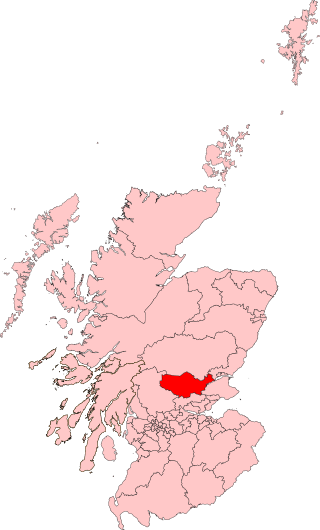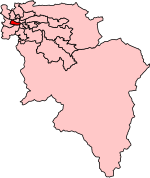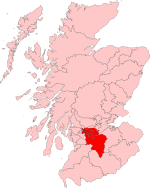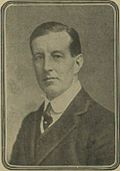
Glasgow Central was a constituency of the House of Commons of the Parliament of the United Kingdom until 2024. A Glasgow Central constituency existed from 1885 until its abolition in 1997. Prior to the 2005 general election, boundary changes led to a new constituency named Glasgow Central being introduced. The constituency was abolished again prior to the 2024 general election. Prior to its abolition, the seat was held by Alison Thewliss of the Scottish National Party (SNP). The first iteration of this constituency was the seat of the former Conservative Prime Minister Bonar Law, who was the shortest-serving UK Prime Minister of the twentieth century.

East Renfrewshire is a constituency of the House of Commons, to the south of Glasgow, Scotland. It elects one Member of Parliament (MP) using the first-past-the-post system of voting.
Dundee was a constituency of the House of Commons of the Parliament of the United Kingdom from 1832 to 1950, when it was split into Dundee East and Dundee West.
Paisley was a parliamentary constituency represented in the House of Commons of the Parliament of the United Kingdom from 1832 until 1983, when it was divided into Paisley North and Paisley South. These two constituencies were in turn amalgamated into Paisley and Renfrewshire South and Paisley and Renfrewshire North in 2005.
Greenock was a burgh constituency represented in the House of Commons of the Parliament of the United Kingdom from 1832 until 1974, when it was abolished and its area was merged into the new Greenock and Port Glasgow constituency.
Glasgow Bridgeton was a parliamentary constituency in the city of Glasgow. From 1885 to 1974, it returned one Member of Parliament (MP) to the House of Commons of the Parliament of the United Kingdom, elected by the first-past-the-post voting system.

Glasgow Camlachie was a burgh constituency represented in the House of Commons of the Parliament of the United Kingdom from 1885 until 1955.
Glasgow Gorbals was a parliamentary constituency in the city of Glasgow. From 1918 until 1974, it returned one Member of Parliament (MP) to the House of Commons of the Parliament of the United Kingdom, elected by the first-past-the-post system.
Glasgow Govan was a parliamentary constituency in the Govan district of Glasgow. It was represented in the House of Commons of the Parliament of the United Kingdom for 120 years; from 1885 until 2005, returning one Member of Parliament (MP) elected by the first-past-the-post system.
Glasgow Partick was a burgh constituency represented in the House of Commons of the Parliament of the United Kingdom from 1918 until 1950.
Glasgow Pollok was a burgh constituency represented in the House of Commons of the Parliament of the United Kingdom from 1918 until 2005, when it was replaced by Glasgow South West. It elected one Member of Parliament (MP) using the first-past-the-post voting system.
Glasgow St. Rollox was a burgh constituency represented in the House of Commons of the Parliament of the United Kingdom from 1885 until 1950. It elected one Member of Parliament (MP) using the first-past-the-post voting system.
South Ayrshire was a county constituency of the House of Commons of the Parliament of the United Kingdom from 1868 until 1983, when it was abolished. It returned one Member of Parliament (MP), elected by the first past the post voting system.

West Renfrewshire was a county constituency of the House of Commons of the Parliament of the United Kingdom from 1885 to 1983 and again from 1997 until 2005. In 2005 the constituency was abolished and the area is now represented by Inverclyde, Paisley and Renfrewshire North and Paisley and Renfrewshire South.

Perth was a constituency of the House of Commons of the Parliament of the United Kingdom from 1832 to 1918, 1918 to 1950, and 1997 to 2005. From 1832 to 1918 it was a burgh constituency. From 1918 to 1950, and 1997 to 2005, it was a county constituency. During each of the three periods it elected one Member of Parliament (MP).
North West Lanarkshire was a county constituency of the House of Commons of the Parliament of the United Kingdom (Westminster) from 1885 to 1918. It elected one Member of Parliament (MP) by the first past the post voting system.
Glasgow Blackfriars and Hutchesontown, representing parts of the city of Glasgow, Scotland, was a burgh constituency represented in the House of Commons of the Parliament of the United Kingdom from 1885 until 1918.
Glasgow College was a parliamentary constituency in Glasgow. It returned one Member of Parliament (MP) to the House of Commons of the Parliament of the United Kingdom, elected by the plurality voting system.
Kirkcaldy Burghs was a burgh constituency of the House of Commons of the Parliament of the United Kingdom (Westminster) from 1832 to 1974. It elected one Member of Parliament (MP) by the first-past-the-post voting system. From 1832 to 1950 it was, officially, a district of burghs constituency.
Partick was a county constituency represented in the House of Commons of the Parliament of the United Kingdom from 1885 until 1918.

 .
.






